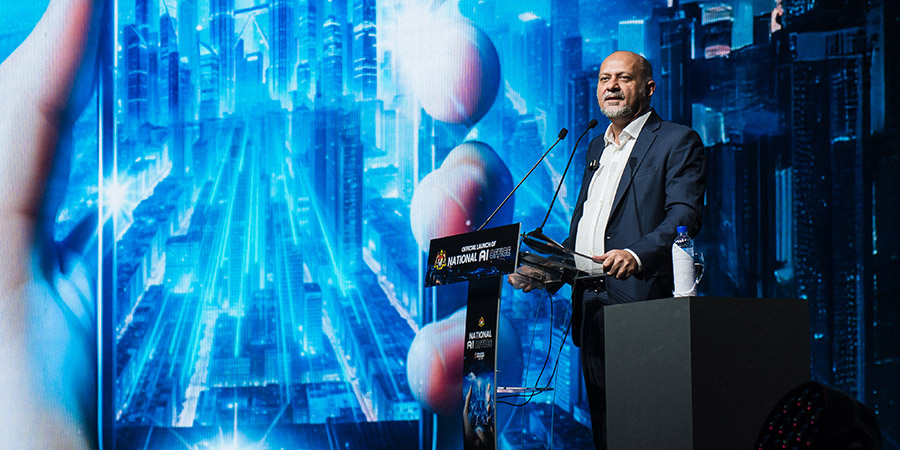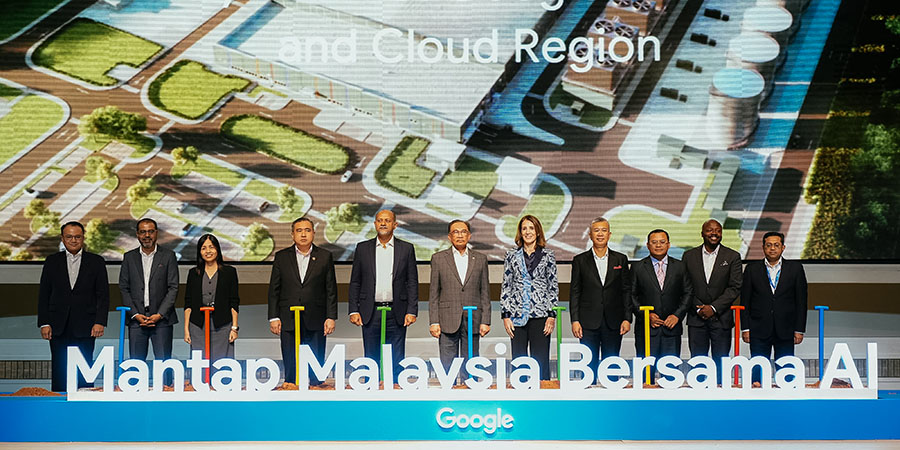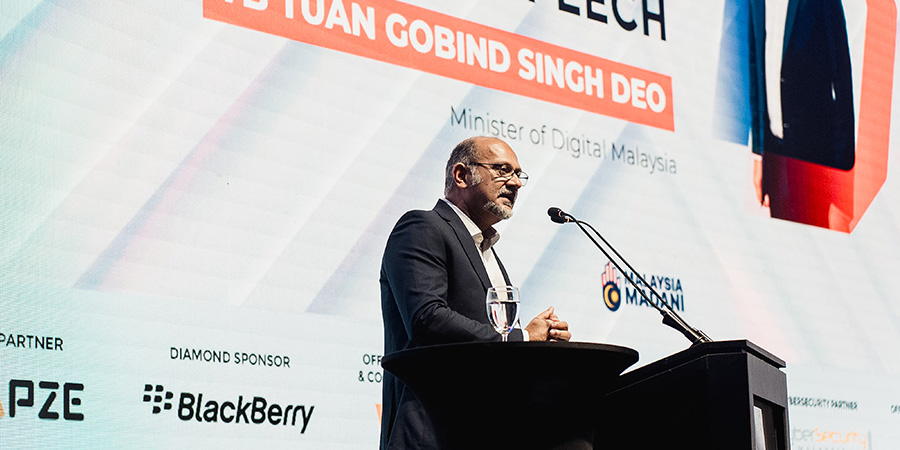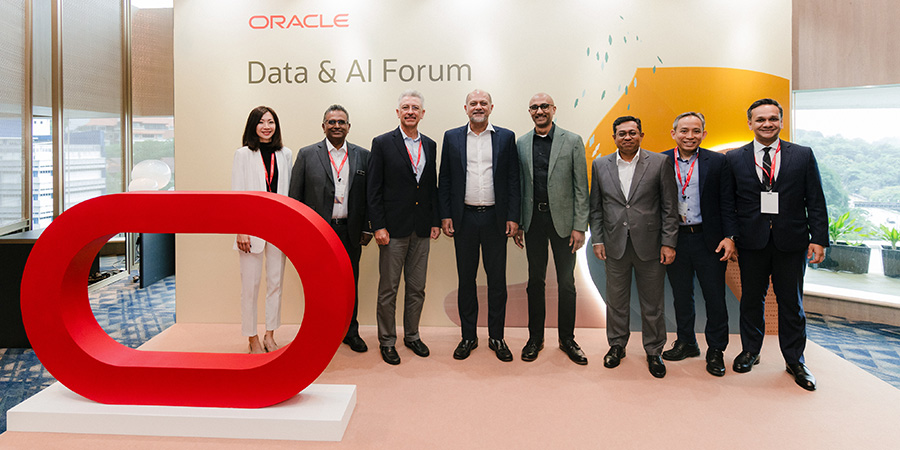As Southeast Asia embraces digital transformation, Malaysia is emerging as a regional tech leader. With strong infrastructure, a strategic location, and a rapidly growing digital economy, the nation is driving innovation and economic growth.
Driving the nation’s digital agenda, the Ministry of Digital was established in December 2023, formed from the former Ministry of Communications and Digital. Led by Malaysia’s first Minister of Digital, Minister Gobind Singh Deo, the ministry aims to position the country as a regional digital powerhouse. In an exclusive interview, Minister Gobind shared key insights into the ministry’s vision and strategies, as well as robust plans for the year ahead.
Can you share more about Malaysia’s digital economy and your vision for Malaysia's digital landscape in the near future?
Malaysia's digital economy is rapidly evolving and expanding and we at the Ministry of Digital are committed to ensuring it becomes a key driver of sustainable economic growth. By the end of 2025, we aim for the digital economy to contribute 25.5% to the national GDP, in line with the Twelfth Malaysia Plan (RMK-12). This is crucial as digitalization is transforming not only our economy but also the way we interact, work, and conduct business in every sector.
Through the national strategic initiative, Malaysia Digital (MD), driven by an agency under my ministry, the Malaysia Digital Economic Corporation (MDEC), we aim to encourage and attract companies, talents, and investments, empowering Malaysian businesses and citizens to play a leading role in the global digital economy. MD focuses on nine high-growth sectors, which are vital to Malaysia’s digital transformation: Digital Agriculture, Digital Services, Digital Cities, Digital Health, Digital Finance, Digital Trade, Digital Content, Digital Tourism, and the Islamic Digital Economy.
We want to transform Malaysia into a regional digital leader by fostering a vibrant, inclusive, and sustainable digital ecosystem. We also aim to position Malaysia as a key player in the ASEAN digital economy, leveraging advanced technologies such as 5G, artificial intelligence (AI), and cloud computing to not only drive innovation but also ensure inclusivity for all Malaysians.

In 2024, we focused on regulation and legislation to align with international standards, strengthen cybersecurity, and protect data. The Ministry of Digital tabled two new bills in parliament: the Cyber Security Act 2024 and the Data Sharing Bill. We also amended the Personal Data Protection Act 2010 to include mandatory data breach notification provisions and increased penalties for non-compliance, amongst other important measures. In 2025, we will work towards further enhancing governance structures surrounding data, infrastructure, cyber resilience, and talent empowerment.
Read More: Boosting Malaysia's Regional Presence Through ICT Expansion
Which initiatives are positioning Malaysia as a leader in digital innovation within the region?
A landmark move to position Malaysia as a leader in AI innovation and competitiveness on the global stage was the establishment of the National Artificial Intelligence Office (NAIO) on 12 December, 2024. This marks the MADANI Government’s commitment to accelerating the nation’s digital transformation and governing AI development. NAIO will focus on collaboration, policy and strategies, the efficient allocation of resources, and governance and security.
NAIO will be incubated by the MyDIGITAL Corporation (another agency under the Ministry of Digital) and will oversee the AI Technology Action Plan 2026-2030. The plan comprises the following: AI Adoption Regulatory Framework, Acceleration of AI Technology Adaptation, AI Code of Ethics, AI Impact Study for Government, National AI Trend Report, and Datasets Related to AI Technology. There will be a strong focus on two major projects, which are the AI Sandbox and National LLM Strategy.
Meanwhile, our digital innovation strategy will be driven by various programs and initiatives under the MD initiative:
The Malaysia Digital Catalytic Programmes (PeMangkinMD) are designed to accelerate growth in high-potential digital sectors through public-private collaborations. MD Tax Incentives offer competitive incentives that encourage investments in digital services and solutions and have been successful in drawing in major global players to set up operations in Malaysia.
Rolled out in August last year, the National E-Invoicing Initiative aligns with the digitalization agenda. This program allows different accounting software and Enterprise Resource Planning (ERP) systems to send and receive e-invoices in a system-to-system manner, enhancing operational efficiency, reducing costs, and improving accuracy and traceability in business transactions. Aligning with a global framework to streamline cross-border transactions will also encourage multinational companies operating in Malaysia to adopt e-invoicing.
Meanwhile, the Gateway, Amplify, Invest & Nurture (GAIN) initiative will continue to empower high-potential Malaysian companies with the tools, skills, and networks necessary for global expansion. By helping these companies scale quickly, we aim to elevate them on the global stage, ensuring Malaysia remains competitive internationally.
To support businesses in their digital transformation journey, various grants are being offered such as the Digital Content Grant (DCG), Malaysia Digital X-Port Grant (MDXG), and Malaysia Digital Catalyst Grant (MDCG).
Of course, all the work we do would be moot without comprehensive, reliable infrastructure. This includes accelerating the National 5G Rollout, which plays a critical role in revolutionizing industries such as agriculture, logistics, healthcare, and manufacturing.
By focusing on these strategic initiatives, Malaysia is driving a comprehensive digital transformation process which promotes sustainable economic growth, enhances digital literacy, and positions the country as a premier digital economy within ASEAN.
What strategies is Malaysia implementing to attract foreign tech investments, and how is the government supporting local tech firms in expanding their presence in international markets?
Malaysia is actively implementing a mix of strategies to attract foreign tech investments while also supporting local tech firms in their global expansion.
Malaysia offers tax incentives through agencies such as the Malaysian Investment Development Authority (MIDA) and the MDEC for foreign investors in high-value industries such as AI, cybersecurity, and integrated circuit (IC) design. Additionally, the Digital Investment Office (DIO) facilitates end-to-end services for digital investments.
We are capitalizing on our strategic location as a gateway to ASEAN’s 600+ million population as well as our advanced infrastructure—including investments in data centers, 5G networks, and smart cities—to attract high-tech industries. The Digital Free Trade Zone (DFTZ), established in 2016, was created to accelerate cross-border e-commerce, fostering trade opportunities for tech firms.
Tech-focused events happening this year such as the KL AI Summit and Smart City Expo (being held in Southeast Asia for the first time) serve as good platforms to showcase Malaysia as a tech destination. For example, a collaboration with Bloomberg will bring top CEOs and digital leaders to Malaysia. There are also ongoing collaborations with global tech giants such as Microsoft, AWS, Google, and others through which we are establishing research and development (R&D) and innovation hubs as well as joint ventures (JVs) in critical areas like IC design and blockchain technology.
Industry News: Malaysia’s Mobile Service Revenue Expected to Grow Through 2028

We realize the timeliness of, and necessity for, policy reforms in keeping up with the latest developments, and are reviewing and ensuring that investor-friendly policies are in place, such as the need to ease foreign equity restrictions in high-tech sectors. This is in addition to aligning digital governance frameworks with global standards to ensure regulatory clarity and investor confidence. In line with this, the Malaysia Tech Entrepreneur Programme (MTEP) for the startup industry facilitates the Knowledge Workers Passes system for experienced tech professionals and investors.
As for our support of local tech firms in global markets, we promote our exports through market access programs via the MDEC and MATRADE, which provides grants, networking platforms, and advisory services, and includes local companies from trade missions to international tech expos such as CES and Web Summit.
Upskilling initiatives are executed in several ways. The TVET system is one of them, where we focus on building skills specific to emerging technologies to increase our workforce’s competitiveness. The government is actively building a talent pipeline. A notable effort is the recent allocation of MYR 50 million in the National Budget for AI education.
Other funding and grants channels include the Digital Content Grant for creative tech and venture funding for AI and blockchain startups. The government is also advocating for more public-private partnerships to co-develop products, ensuring tech transfer and global exposure.

Last but not least, with Malaysia chairing ASEAN in 2025, we have the opportunity to take the lead in these initiatives, and at the same time, position Malaysia as a leading digital community and economic coalition, guided by the ASEAN Digital Masterplan (ADM) 2025 and its post-2025 vision. It is important for us to position local tech firms in regional supply chains, bolster their presence in ASEAN markets, and promote the region as a unified digital economy. Plans are underway to showcase local firms and attract foreign investors through events like the Asia Investment Build-Up and LEVEL UP KL. Many more international conferences and industry events are in the offing this year.
Also Read: Malaysia's Cyber Security Bill 2024: A Game-Changer in Digital Defense
What developments are in the pipeline to promote digital literacy and skilled digital talent across the country?
Developing digital talent is a key pillar of our national digital economy strategy. The Ministry of Digital, together with our agency, MDEC, has various initiatives in place, all of which aim to upskill the workforce and promote digital literacy across all levels of society.
The Saya Digital Campaign was launched in 2020 and aims to empower Malaysians with essential digital skills to thrive in the digital economy and manage the rising cost of living, especially in underserved urban and rural areas. The initiative supports the Ministry’s three core pillars —Digital Government, Digital Economy, and Digital Society. This campaign is carried out via the nationwide Jelajah Saya Digital (JSD) program.
Public-private-academic sector initiatives like MyDigitalMaker aim to transform Malaysian youth from digital users into digital producers in the digital economy. This initiative provides exposure and hands-on activities that include coding, app development, AI, 3D printing, drone operating, robotics, embedded programming, and data analytics. More than 2.5 million students have taken part in this program and over 106 teachers have been certified as AI instructors.
The eUsahawan Digital Entrepreneurship initiative encompasses external and online learning exercises to train individuals, students, and micro-entrepreneurs in digital entrepreneurship to generate income, carry out product marketing, and increase sales.
Through a collaboration with the Ministry of Higher Education, the Premier Digital Tech Institutions (PDTI) initiative identifies and supports institutions that consistently produce graduates that are ready for the industry. With 42 faculties and seven polytechnics accredited, the PDTI has nurtured over 50,000 graduates, boasting a 95% employability rate.
In addition to this, the MD Workforce was launched in 2020 and focuses on enhancing the skills of individuals (particularly the youth) in key digital sectors such as cybersecurity, data analytics, and AI. More than 42,500 individuals have benefited from these programs, improving their employability and aligning their skills with market demands.
Through these initiatives, we are confident that Malaysia will create 500,000 high-quality digital jobs by 2025, further cementing our position as a leader in the ASEAN digital economy.
How do advancements in AI and IoT impact various sectors in Malaysia, and what strategies are in place to integrate them into the national development agenda?
Advancements in AI and IoT are significantly transforming various sectors in Malaysia by enhancing efficiency, innovation, and sustainability.
In manufacturing, AI and IoT technologies drive smart automation and predictive maintenance, optimizing production processes, reducing downtime, and enhancing overall productivity. Precision farming in agriculture has enabled our palm oil plantation companies, for example, to monitor soil conditions and crop health, minimize resource usage, and implement more sustainable practices through AI solutions.

AI is revolutionizing healthcare delivery by enabling predictive analytics, personalized treatment plans, and improved diagnostics. The health minister recently mentioned that the Ministry is open to incorporating disease-detecting AI technology—particularly in cancer diagnosis—within public hospitals.
Other sectors in which AI and IoT will bring benefits include the logistics sector, using real-time tracking and data analytics to optimize routes and inventory management; and financial services, where AI can enhance fraud detection, risk assessment, and personalize customer experiences.
To effectively integrate AI and IoT into Malaysia's national development agenda, we have defined a clear strategy in the National AI Roadmap. This roadmap outlines our goals, investment plans, and ethical frameworks to ensure responsible AI development and deployment.
Key elements of our strategy include a collaborative effort led by the MDEC in partnership with the Ministry of Science, Technology, and Innovation (MOSTI) and the Ministry of Education, which aligns AI initiatives with national priorities.
Other elements include talent development programs to bridge the skilled workforce gap, industry collaborations, incentivized programs, and ethical AI development to ensure adherence to established ethical standards.
Meanwhile, the Ministry of Trade, Investment & Industry-led New Industrial Master Plan 2030 aims to nurture local technology solution providers and support the Technology Adoption Program, which will benefit 3,000 smart manufacturers by 2030 under SIRIM’s Tech-Up Program.
Public outreach programs are also underway to foster a culture of digital innovation and encourage the responsible use of AI technologies among citizens.
By leveraging these strategies and actively involving all stakeholders, Malaysia is poised to navigate its journey towards becoming an AI-ready nation, ultimately enhancing economic growth and improving the quality of life for all citizens.
Also Read:
Malaysia’s Push for Rural Connectivity
Malaysia's Digital Transformation: How is DNB Pioneering Connectivity





